fuel pump Citroen DS3 RHD 2016 1.G Owner's Manual
[x] Cancel search | Manufacturer: CITROEN, Model Year: 2016, Model line: DS3 RHD, Model: Citroen DS3 RHD 2016 1.GPages: 380, PDF Size: 10.11 MB
Page 194 of 380
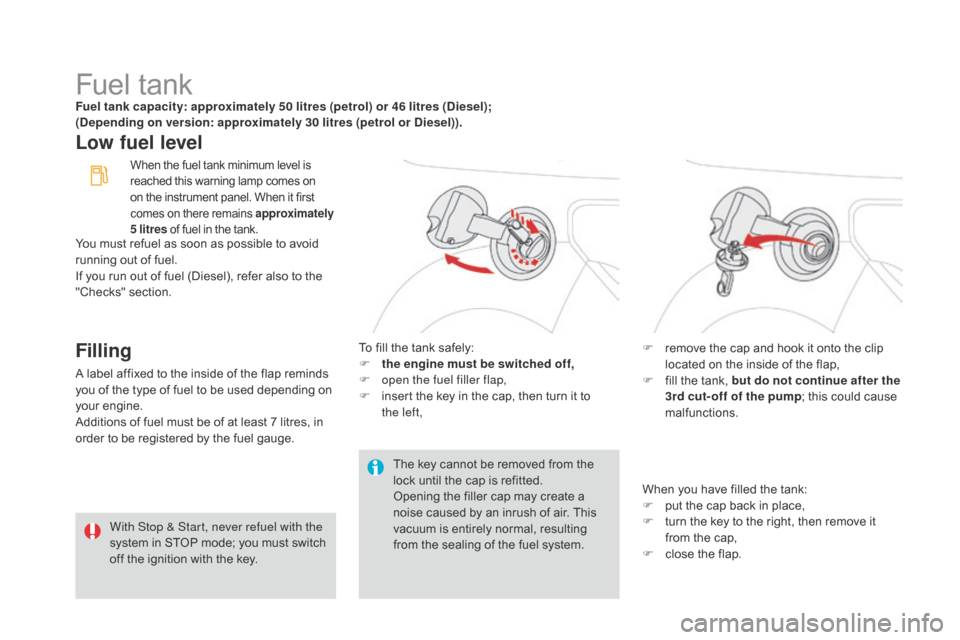
Fuel tankFuel tank capacity: approximately 50 litres (petrol) or 46 litres (diesel);
(dep ending on version: approximately 30 litres (petrol or di esel)).
Low fuel level
Filling
A label affixed to the inside of the flap reminds you of the type of fuel to be used depending on
y
our
eng
ine.
Additions
of fuel must be of at least 7 litres, in
o
rder to be registered by the fuel gauge.The
key cannot be removed from the
l
ock until the cap is refitted.
Opening
the filler cap may create a
n
oise caused by an inrush of air. This
v
acuum is entirely normal, resulting
f
rom the sealing of the fuel system.
To
fill the tank safely:
F t he engine must be switched off,
F o pen the fuel filler flap,
F
i
nsert the key in the cap, then turn it to
t
he
left,F
r
emove the cap and hook it onto the clip l
ocated on the inside of the flap,
F f ill the tank, but do not continue after the
3rd cut- off of the pump ;
this could cause
m
alfunctions.
When
you have filled the tank:
F
p
ut the cap back in place,
F
t
urn the key to the right, then remove it
f
rom the cap,
F
c
lose the flap.
When the fuel tank minimum level is reached this warning lamp comes on o
n the instrument panel. When it first
c
omes on there remains approximately
5 litres
of fuel in the tank.
With Stop & Start, never refuel with the
system in STOP mode; you must switch
o
ff the ignition with the key.
You
must refuel as soon as possible to avoid
r
unning out of fuel.
If
you
run out of fuel (Diesel), refer also to the
"
Checks"
s
ection.
Page 195 of 380
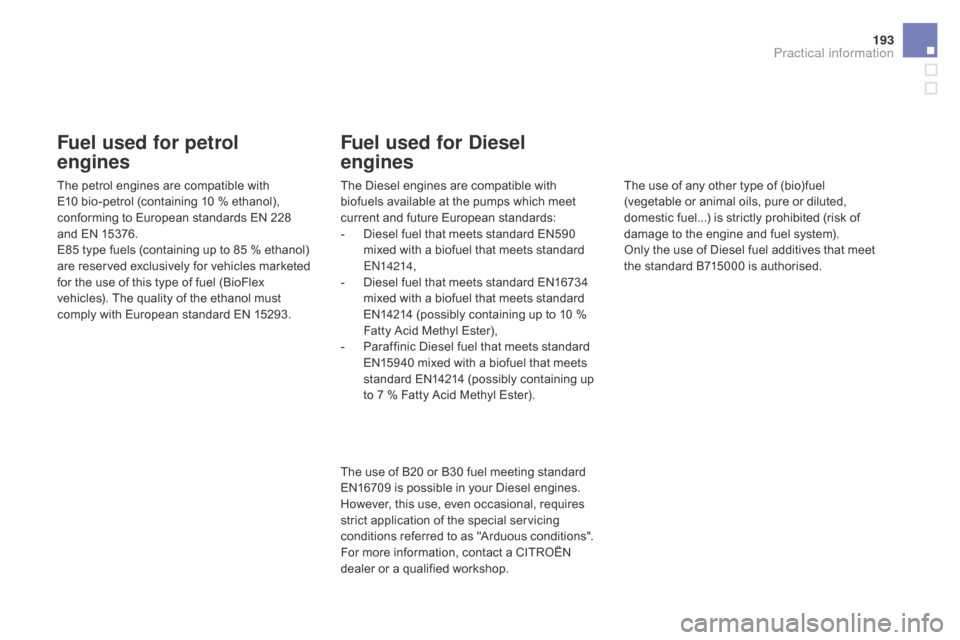
193
Fuel used for petrol
engines
The petrol engines are compatible with E
10 bio-petrol (containing 10 % ethanol),
c
onforming to European standards EN 228
and
EN 15376.
E85
type fuels (containing up to 85 % ethanol)
a
re reserved exclusively for vehicles marketed
f
or the use of this type of fuel (BioFlex
v
ehicles). The quality of the ethanol must
c
omply with European standard EN 15293.
Fuel used for diesel
engines
The Diesel engines are compatible with b
iofuels available at the pumps which meet
c
urrent and future European standards:
-
D
iesel fuel that meets standard EN590
m
ixed with a biofuel that meets standard
E
N14214,
-
D
iesel fuel that meets standard EN16734
m
ixed with a biofuel that meets standard
E
N14214 (possibly containing up to 10 %
F
atty Acid Methyl Ester),
-
P
araffinic Diesel fuel that meets standard
E
N15940 mixed with a biofuel that meets
s
tandard EN14214 (possibly containing up
t
o 7 % Fatty Acid Methyl Ester).
The
use of B20 or B30 fuel meeting standard
E
N16709 is possible in your Diesel engines.
H
owever, this use, even occasional, requires
s
trict application of the special servicing
c
onditions referred to as "Arduous conditions".
F
or more information, contact a CITROËN
d
ealer or a qualified workshop. The
use of any other type of (bio)fuel (
vegetable or animal oils, pure or diluted,
d
omestic fuel...) is strictly prohibited (risk of
d
amage to the engine and fuel system).
Only
the use of Diesel fuel additives that meet
t
he standard B715000 is authorised.
Practical information
Page 196 of 380
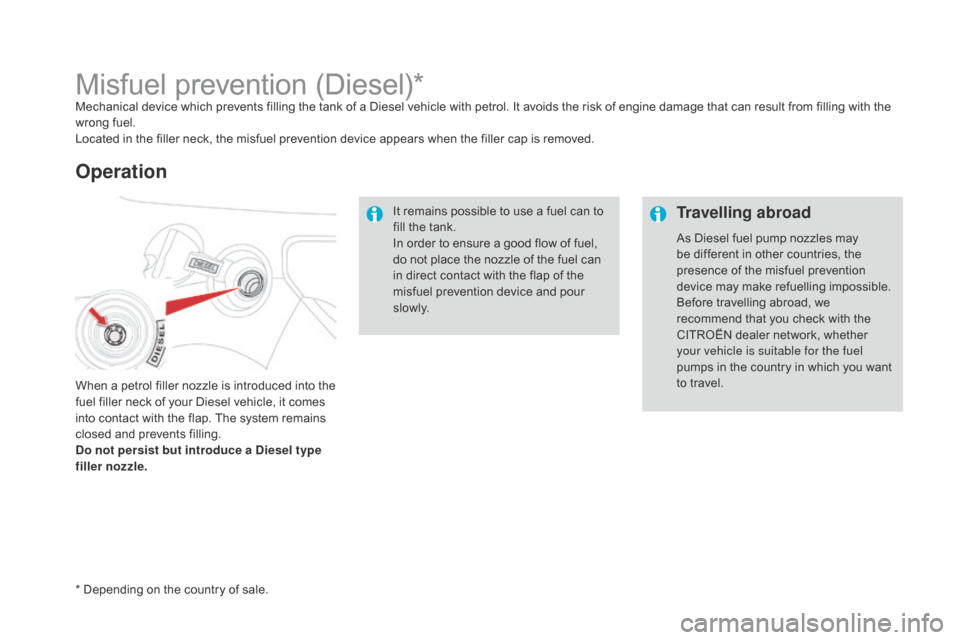
Misfuel prevention (Diesel)*Mechanical device which prevents filling the tank of a Diesel vehicle with petrol. It avoids the risk of engine damage that can result from filling with the wrong fuel.
Located
in the filler neck, the misfuel prevention device appears when the filler cap is removed.
Operation
When a petrol filler nozzle is introduced into the fuel filler neck of your Diesel vehicle, it comes
i
nto contact with the flap. The system remains
c
losed and prevents filling.
do n
ot persist but introduce a d
i
esel type
filler nozzle. It
remains possible to use a fuel can to
f
ill the tank.
In order to ensure a good flow of fuel,
d
o not place the nozzle of the fuel can
i
n direct contact with the flap of the
m
isfuel prevention device and pour
s
l ow l y.
Travelling abroad
As Diesel fuel pump nozzles may b
e different in other countries, the
p
resence of the misfuel prevention
d
evice may make refuelling impossible.
Before
travelling abroad, we
r
ecommend that you check with the
C
ITROËN dealer network, whether
y
our vehicle is suitable for the fuel
pumps
in the country in which you want
t
o travel.
*
Depending
on
the
country
of
sale.
Page 197 of 380
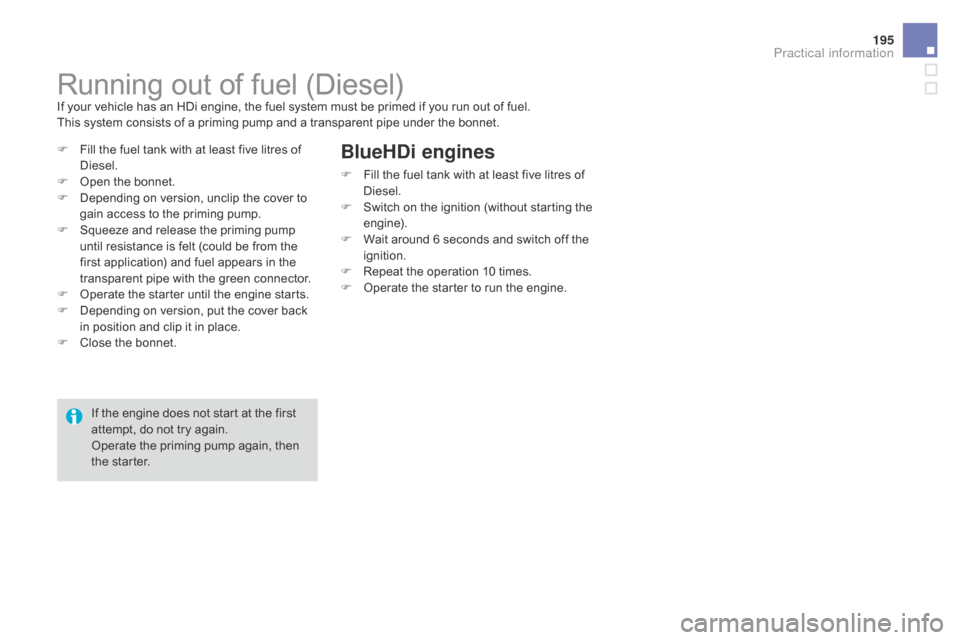
195
Running out of fuel (Diesel)If your vehicle has an HDi engine, the fuel system must be primed if you run out of fuel.
T his system consists of a priming pump and a transparent pipe under the bonnet.
F
F
ill the fuel tank with at least five litres of
D
iesel.
F
O
pen the bonnet.
F
D
epending on version, unclip the cover to
g
ain access to the priming pump.
F
S
queeze and release the priming pump
u
ntil resistance is felt (could be from the
f
irst application) and fuel appears in the
t
ransparent pipe with the green connector.
F
O
perate the starter until the engine starts.
F
D
epending on version, put the cover back
i
n position and clip it in place.
F
C
lose the bonnet.
BlueHdi engines
F Fill the fuel tank with at least five litres of D
iesel.
F
S
witch on the ignition (without starting the
e
ngine).
F
W
ait around 6 seconds and switch off the
ig
nition.
F
R
epeat the operation 10 times.
F
O
perate the starter to run the engine.
If
the
engine
does
not
start
at
the
first
a
ttempt,
do
not
try
again.
Operate
the
priming
pump
again,
then
t
he
starter.
Practical information
Page 230 of 380
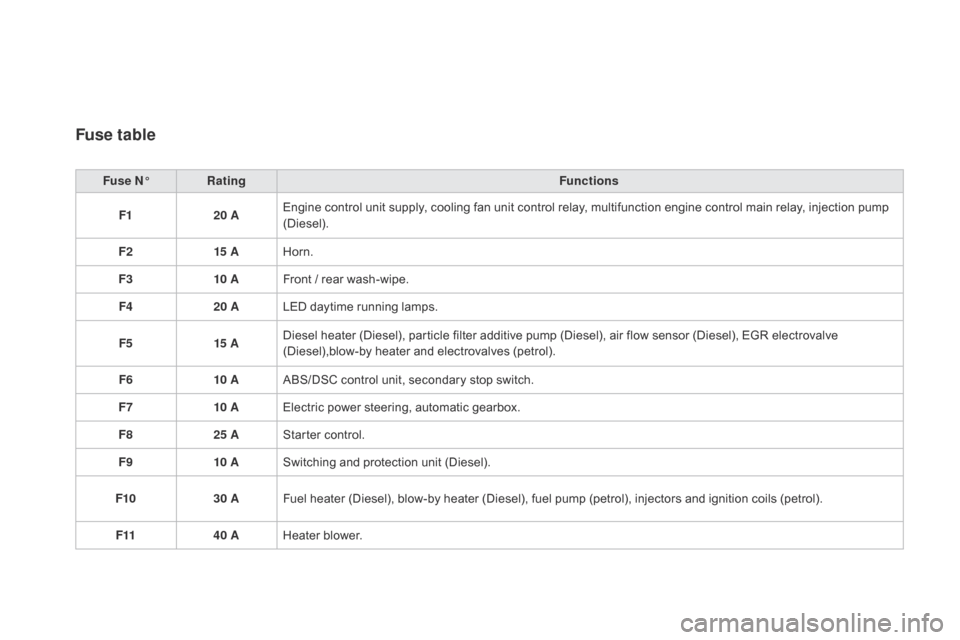
Fuse table
Fuse n°R ating Functions
F1 20 AEngine
control unit supply, cooling fan unit control relay, multifunction engine control main relay, injection pump
(
Diesel).
F2 15 AHorn.
F3 10 AFront
/ rear wash-wipe.
F4 20 ALED
daytime running lamps.
F5 15 ADiesel
heater (Diesel), particle filter additive pump (Diesel), air flow sensor (Diesel), EGR electrovalve
(
Diesel),blow-by heater and electrovalves (petrol).
F6 10 AABS/DSC
control unit, secondary stop switch.
F7 10 AElectric
power steering, automatic gearbox.
F8 25 AStarter
control.
F9 10 ASwitching
and protection unit (Diesel).
F10 30 AFuel
heater (Diesel), blow-by heater (Diesel), fuel pump (petrol), injectors and ignition coils (petrol).
F11 40 AHeater
b
lower.
Page 231 of 380

229
Fuse n°R ating Functions
F12 30 AWindscreen
wipers slow / fast speed.
F13 40 ABuilt-in
systems inter face supply (ignition positive).
F14 30 AValvetronic
s
upply
(
petrol).
F15 10 ARight-hand
main beam headlamps.
F16 10 ALeft-hand
main beam headlamps.
F17 15 ALeft-hand
dipped beam headlamps.
F18 15 ARight-hand
dipped beam headlamps.
F19 15 AOxygen
sensors and electrovalves (petrol), electrovalves
(
Diesel), EGR electrovalve (Diesel).
F20 10 APumps,
electronic thermostat (petrol), timing electrovalve
(
THP), water in fuel sensor (Diesel).
F21 5 AFan
assembly control supply, ABS/DSC, turbo pump (THP).
Practical information
Page 253 of 380
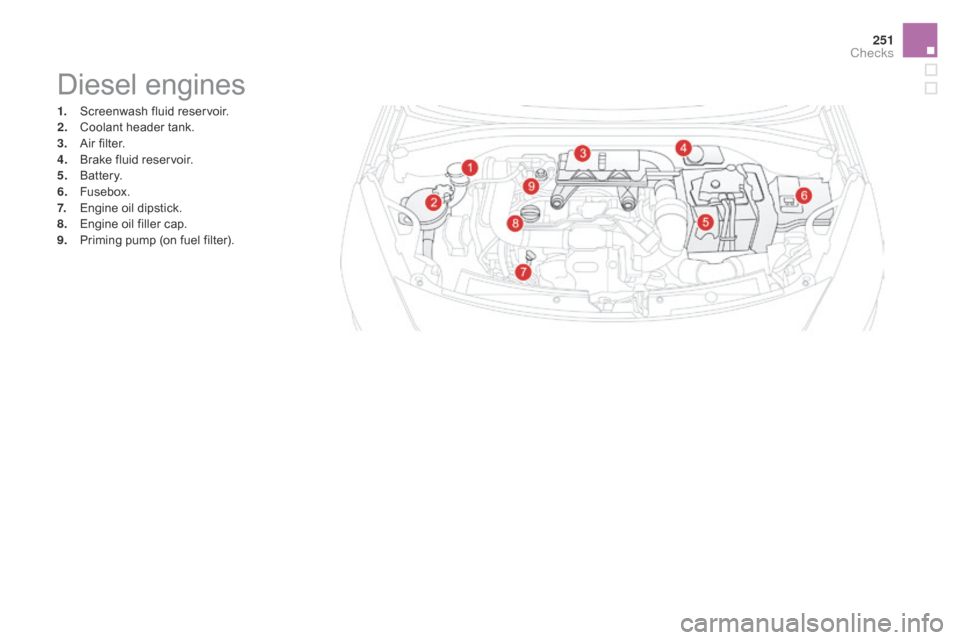
251
Diesel engines
1. Screenwash fluid reservoir.
2. C oolant header tank.
3.
A
ir filter.
4.
B
rake fluid reservoir.
5.
B
attery.
6.
F
usebox.
7.
E
ngine oil dipstick.
8.
E
ngine oil filler cap.
9.
P
riming pump (on fuel filter).
Checks